Fleurs du Mal Magazine


Or see the index
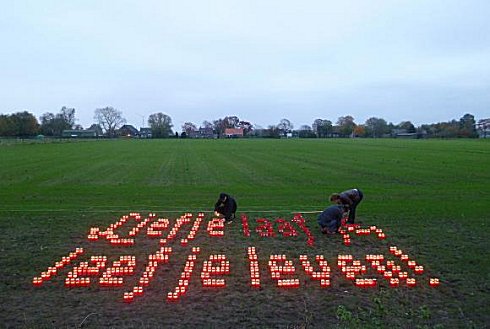
nick j. swarth
Tentoonstelling Visuele Poëzie
schrijft wedstrijd uit
De Tentoonstelling Visuele poëzie, die van 9 t/m 25 november 2012 plaatsvindt in de Goretti Kapel te Tilburg, schrijft een unieke wedstrijd uit. De organisatie daagt professionele makers, studenten en amateurs uit een visueel poëtisch werk in te sturen.
Ben jij een dichter die graag verbeeld of ben je een beeldmaker, maar diep in je hart tegelijk een poëet? Heb je een werk dat binnen dit genre past? Of inspiratie om zo spoedig mogelijk aan de slag te gaan? Dan is dit je kans!
Overdonder de jury met een geweldig poëtisch visueel werk en stuur foto’s en een korte omschrijving in! Het werk zelf kan 2D zijn, of ruimtelijk, audiovisueel of multimediaal. Kijk voor meer informatie over de tentoonstelling en deelname aan deze wedstrijd op: http://www.facebook.com/VisuelePoezie

fleursdumal.nl magazine
More in: CONCRETE , VISUAL & SOUND POETRY, Swarth, Nick J.
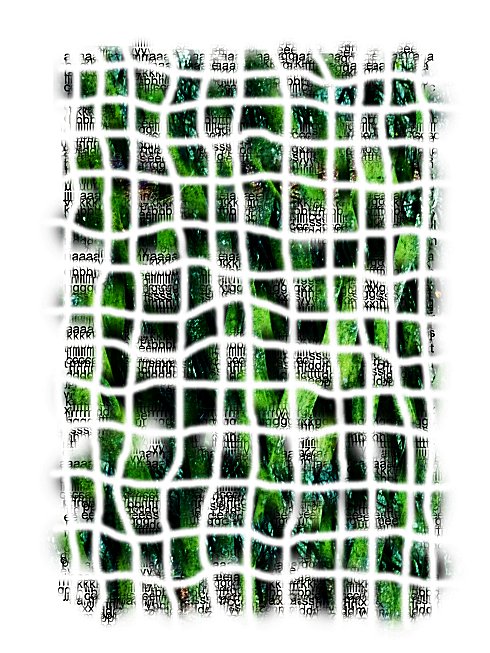
Freda Kamphuis ©2012: Verweven
kempis.nl poetry magazine
More in: Freda Kamphuis, Kamphuis, Freda
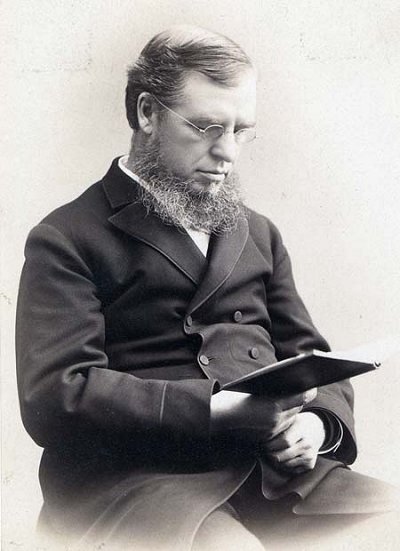
John White Chadwick
(1840-1904)
The hardest lot
O look upon the face of a dead friend
Is hard; but ’tis not more than we can bear
If, haply, we can see peace written there,–
Peace after pain, and welcome so the end,
Whate’er the past, whatever death may send.
Yea, and that face a gracious smile may wear,
If love till death was perfect, sweet, and fair;
But there is woe from which may God defend:
To look upon our friendship lying dead,
While we live on, and eat, and drink, and sleep–
Mere bodies from which all the soul has fled–
And that dead thing year after year to keep
Locked in cold silence in its dreamless bed:–
There must be hell while there is such a deep.
“The Hardest Lot” is reprinted from American Sonnets. Ed. William Sharp. London: Walter Scott, 1889
John White Chadwick poetry
kempis.nl poetry magazine
More in: Archive C-D

William Shakespeare
Sonnet 143
Lo as a careful huswife runs to catch
One of her feathered creatures broke away,
Sets down her babe and makes all swift dispatch
In pursuit of the thing she would have stay:
Whilst her neglected child holds her in chase,
Cries to catch her whose busy care is bent,
To follow that which flies before her face,
Not prizing her poor infant’s discontent;
So run’st thou after that which flies from thee,
Whilst I thy babe chase thee afar behind,
But if thou catch thy hope turn back to me:
And play the mother’s part, kiss me, be kind.
So will I pray that thou mayst have thy Will,
If thou turn back and my loud crying still.
Sonnet 143
Zoals bezorgd een huisvrouw rennen gaat
Achter haar pluimvee aan als ’t haar ontvlucht,
Zo rap ze kan, en baby achterlaat,
Op zoek naar wat zich vrijvocht uit haar tucht:
Met het verwaarloosd kind achter zich aan,
Dat om haar aandacht krijst, als zij zich wijdt
Aan jacht op wat haar zicht dreigt te ontgaan,
Onaangeroerd door kleuter’s zieligheid;
Zo ren jij acherna wat jou ontsnapt,
En ik je peuter houd je lang niet bij:
Kom terug als je die taak hebt opgeknapt:
En speel de moederrol, wees lief, kus mij.
Zo zal ik bidden dat jouw Wil je zint,
Als jij mijn krijten stilt en mij hervindt.
Vertaling: Cornelis W. Schoneveld, sept 2012
kempis.nl poetry magazine
More in: Shakespeare
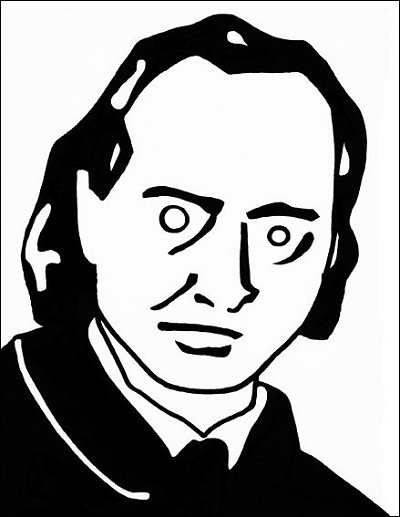
Wouter van Riessen
BOEKUITGAVE HOMMAGE À BAUDELAIRE
Uitgeverij Voetnoot bestaat 25 jaar. Galerie Baudelaire bestaat 10 jaar. Oprichters Henrik Barends en Anneke Pijnappel vonden dit aanleiding genoeg om betrokken schrijvers, dichters, vertalers, fotografen en kunstenaars te vragen een hommage aan Baudelaire te maken.
Waarom een hommage aan Baudelaire? Twee motieven liggen hieraan ten grondslag. Voetnoot ging van start met de Nederlandse vertaling van de Kunstkritieken van Charles Baudelaire (1821 – 1867). In zijn kunstkritische beschouwingen stelde deze Franse dichter, schrijver en kunstcriticus de scheppende verbeelding boven het uitbeelden van de zichtbare werkelijkheid. Deze stelling vormt ook het uitgangspunt van van de fotografie die in Galerie Baudelaire wordt getoond. De verrassende bijdragen zijn bijeengebracht in de bundel Hommage à Baudelaire.
De invulling van het thema Baudelaire is vanzelfsprekend prikkelend, uitgesproken, wakkerschuddend, rauw, soms beneveld, soms juist niet, en door de totaal verschillende invalshoeken ook steeds weer boeiend.
Bijdragen: Anne van Amstel, Henrik Barends, Pierre Bergounioux, Patricia Beysens, Diana Blok, Wineke de Boer, Rommert Boonstra, Bart Brey, Marlo Broekmans, Denis Brun, Maarten van Buuren, Julien Coulommier, Kiki Coumans, Peter Day, Martijn Doolaard, Drs.P, Just Enschedé, Winfred Evers, Jan Eyskens, Paul Fleming, Lionel Fourneaux, René Franken, Philip Freriks, d’Hanis & Lachaert, Martin de Haan, Hardeman & Schilstra, Rokus Hofstede, Jos Houweling, Paul Ilegems, Evelyn Jansen, Freda Kamphuis, Hilde Keteleer, Herman Koch, Bart Koubaa, Arthur Lava, Ingeborg Leijerzapf, Dirk Leyman, Winnifred Limburg, Bart Van Loo, Guus Luijters, Sylvia Marijnissen, Eddie Marsman, Lotte Menkman, Kees Mercks, Pierre Michon, Eric Min, Cornelia Nauta, Paul & Menno de Nooijer, Laurent Olivès, Paul Overdijk, Jef Paepen, Ruudt Peters, Susanne Piët, Anneke Pijnappel, Hans van Pinxteren, Rudo Prekop, Wouter van Riessen, William Ropp, Nora De Rudder, Tineke de Ruiter, Schilte & Portielje, K. Schippers, Désirée Schyns, Carolein Smit, Vasil Stanko, Tono Stano, F. Starik, Rob Steenhorst, Jan Pieter van der Sterre, Miro Svolik, Michel Szulc Krzyzanowski, Henk Tas, Nadine Tasseel, Rob Versluys, Jan Vissers, Oscar Voch, Andrea Voigt, Barbara de Vries, Jacquie Maria Wessels, Ivo de Wijs, Lam de Wolf, John Wood, Willem van Zadelhoff, Vladimir Zidlicky, Aart van Zoest, Peter Zupnik
Deze jubileumuitgave bevat 340 pagina’s, 20 x 15,5 cm, is geïllustreerd, is beschikbaar met vier verschillende omslagen en is niet te koop in de boekhandel. In Nederland exclusief verkrijgbaar in de boekwinkel van Bijzondere Collecties UvA, Turfmarkt 129, Amsterdam en via www.voetnootpublishers.nl. Prijs € 15.
BOEKENSALON + EXPO BARENDS & PIJNAPPEL: 19.9/30.9
Op 19 september droeg grafisch vormgever Henrik Barends (Amsterdam, 1945) zijn archief officieel over aan de Universiteit van Amsterdam, afdeling Bijzondere Collecties. Deze overdracht en het jubileum van Uitgeverij Voetnoot vormden de aanleiding tot een feestelijke boekensalon, die vergezeld gaat van een kleine expositie. Museumcafé, Oude Turfmarkt 129, Amsterdam. Dinsdag – vrijdag van 10 – 17 uur, zaterdag – zondag van 13 – 17 uur.
GALERIE BAUDELAIRE – VLAAMSEKAAI 28/ANTWERPEN – 9.9/6.10
Groepstentoonstelling Hommage à Baudelaire met de visuele bijdragen van alle bovengenoemde fotografen en kunstenaars. Open zaterdag 14 – 18 uur en op afspraak. www.galeriebaudelaire.be
fleursdumal.nl magazine
More in: Archive A-B, Archive A-B, Baudelaire, Charles, Freda Kamphuis

Zilveren favorieten
bij het schilderij van Lawrence Alma-Tadema
Water om water. Daartussen vrouwen,
die drie die standbeeld zijn van eigen stilleven,
rustend op marmer alsof zij er zelf van schijnen.
Kruimels hangen stil tussen een hand en mondjes
van vissen die liever dan bekeken
onzichtbaar zouden zwemmen in de open
zee die zij veraf vermoeden en dichter hopen.
Wij weten haar vlakbij. Geen geluid weerklinkt
al zingt in elk hoofd een droom.
Zeer strak staat alles stil en nauwelijks
nog is blauw een kleur te noemen.
De wereld lijkt wel monochroom.
Bert Bevers
(uit Afglans – Gedichten 1972-1997, Uitgeverij WEL, Bergen op Zoom, 1997)
kempis.nl poetry magazine
More in: Archive A-B, Bevers, Bert
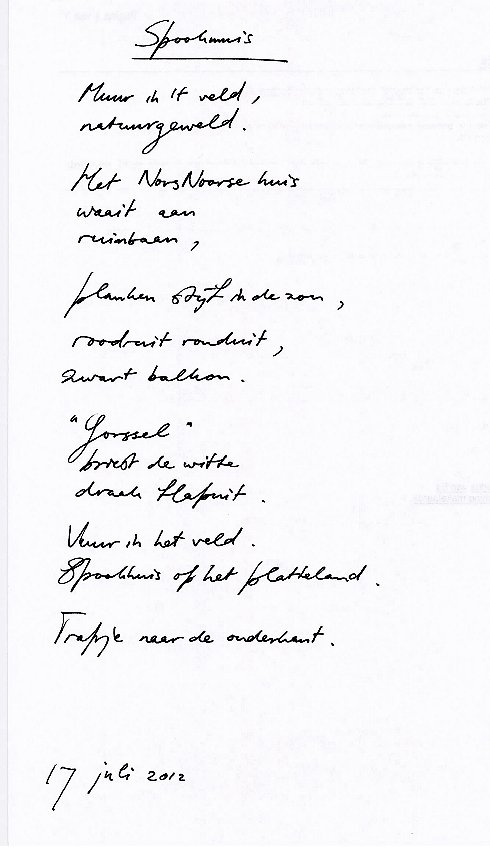
Eelke van Es
Eelke van Es poetry
kempis.nl poetry magazine
More in: Archive E-F, Es, Eelke van
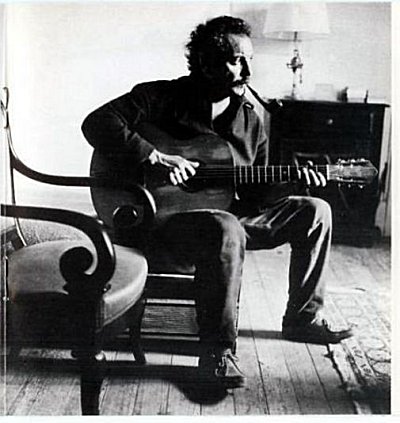
Georges Brassens
(1921-1981)
Les copains d’abord
Non, ce n’était pas le radeau
De la Méduse, ce bateau,
Qu’on se le dis’ au fond des ports,
Dis’ au fond des ports,
Il naviguait en pèr’ peinard
Sur la grand’ mare des canards,
Et s’app’lait les Copains d’abord
Les Copains d’abord.
Ses fluctuat nec mergitur
C’était pas d’la litteratur’,
N’en déplaise aux jeteurs de sort,
Aux jeteurs de sort,
Son capitaine et ses mat’lots
N’étaient pas des enfants d’salauds,
Mais des amis franco de port,
Des copains d’abord.
C’étaient pas des amis de lux’,
Des petits Castor et Pollux,
Des gens de Sodome et Gomorrh’,
Sodome et Gomorrh’,
C’étaient pas des amis choisis
Par Montaigne et La Boeti’,
Sur le ventre ils se tapaient fort,
Les copains d’abord.
C’étaient pas des anges non plus,
L’Évangile, ils l’avaient pas lu,
Mais ils s’aimaient tout’s voil’s dehors,
Tout’s voil’s dehors,
Jean, Pierre, Paul et compagnie,
C’était leur seule litanie
Leur Credo, leur Confiteor,
Aux copains d’abord.
Au moindre coup de Trafalgar,
C’est l’amitié qui prenait l’quart,
C’est elle qui leur montrait le nord,
Leur montrait le nord.
Et quand ils étaient en détresse,
Qu’leurs bras lancaient des S.O.S.,
On aurait dit les sémaphores,
Les copains d’abord.
Au rendez-vous des bons copains,
Y’avait pas souvent de lapins,
Quand l’un d’entre eux manquait a bord,
C’est qu’il était mort.
Oui, mais jamais, au grand jamais,
Son trou dans l’eau n’se refermait,
Cent ans après, coquin de sort !
Il manquait encor’.
Des bateaux j’en ai pris beaucoup,
Mais le seul qui ait tenu le coup,
Qui n’ai jamais viré de bord,
Mais viré de bord,
Naviguait en père peinard
Sur la grand’ mare des canards,
Et s’app’lait les Copains d’abord
Les Copains d’abord.
Georges Brassens poetry
kempis.nl poetry magazine
More in: Archive A-B

Anne Boleyn?
(1507?-1536)
O Death, Rock Me Asleep
DEATH, rock me asleep,
Bring me to quiet rest,
Let pass my weary guiltless ghost
Out of my careful breast.
Toll on, thou passing bell;
Ring out my doleful knell;
Let thy sound my death tell.
Death doth draw nigh;
There is no remedy.
My pains who can express?
Alas, they are so strong;
My dolour will not suffer strength
My life for to prolong.
Toll on, thou passing bell;
Ring out my doleful knell;
Let thy sound my death tell.
Death doth draw nigh;
There is no remedy.
Alone in prison strong
I wait my destiny.
Woe worth this cruel hap that I
Should taste this misery!
Toll on, thou passing bell;
Ring out my doleful knell;
Let thy sound my death tell.
Death doth draw nigh;
There is no remedy.
Farewell, my pleasures past,
Welcome, my present pain!
I feel my torments so increase
That life cannot remain.
Cease now, thou passing bell;
Rung is my doleful knell;
For the sound my death doth tell.
Death doth draw nigh;
There is no remedy.
Anne Boleyn poetry
fleursdumal.nl magazine
More in: Anne Boleyn, Archive A-B

Esther Porcelijn
Lift
Je mag een gegeven paard niet in de bek kijken. Apparentlie det is un rule.
In de trein op 12 april, de avond van de 3FM Awards in Amsterdam. Dat weet ik omdat de trein vol zit met vertraagde tieners die al uren tussen Amsterdam en Rotterdam aan het reizen waren.
Ik zat ook in die trein vanaf Rotterdam naar Breda, en dan hopelijk naar Tilburg.
Ik pak altijd per ongeluk een te late trein waarvan ik niet zeker weet of die nog echt terecht komt waar ik terecht wil komen. Dus, deze trein gaat maar tot Dordrecht. Echt flut, ken daar niemand.
Dus ik hoor een jongen en een meisje spreken over dat ze naar Tilburg moeten.
Ik zet onmiddellijk mijn aller-leukste hoofd aan en zeg dat ik super-toevalligerwijs ook naar Tilburg moet en of we samen een taxi kunnen nemen.
Zij kijken nogal beduusd maar vinden het prima. Ik klets wat verder en vraag of “Go Back to the Zoo” supervet was en zij Giel Beelen ook zo megacool vinden.
Verder meen ik alles wel oprecht, want ze zijn aardig en ik wil heel erg graag nog in Tilburg komen. Ze gaan niet met de taxi maar de vader van de jongen komt ze in Dordrecht ophalen. Mag ik mee? Ja ik mag mee. Prima.
Ze moeten naar de Reeshof maar ze kunnen mij wel afzetten bij Tilburg-West, o nee, sorry: Universiteit. Fijn.
In Dordrecht op het station loop ik achter ze aan. Het meisje is heel aardig, de jongen is wat stil maar ik klets wel om het gezellig te houden.
We komen aan bij de auto van de vader en de moeder staat ons op te wachten. Ze kijkt de jongen aan en zegt: “Een vreemde.…Neem je een vreemde mee?” De jongen legt uit dat er geen treinen meer rijden en dat ik ook naar Tilburg moet. De moeder zegt: “Oh, en dan neem je gewoon een vreemde mee?” Ondertussen heeft ze mij nog niet één keer echt aangekeken en ik zet mijn allerliefste hoofd aan, als van een kitten in een nestje: “neem mij ah toe neem mij!”
De moeder moet het nog éven met de vader bespreken en ik hoor de man wat mompelen over “liever niet” en “vooruit dan maar.”
Ik controleer mijzelf en ik ben toch echt een meisje!? Ik ben geen enorme man van 2 meter met bloed op z’n wife-beater? In ieder geval kan ik mee en ik stap in. Mooi.
Ik zit in het midden van de achterbank en probeer zo goed mogelijk het gesprek op gang te houden. De ouders zeggen geen woord tegen mij. Ik wordt steeds meer verlegen, en raak in een toestand waarin ik niets meer durf te zeggen tegen de volwassenen voorin. Alsof er familieruzie is geweest en we nog helemaal naar Frankrijk moeten op vakantie én het gezellig moeten hebben. De ouders stellen vragen aan de kinderen en de moeder vond het blijkbaar al een idioot idee om he-le-maal van Tilburg naar Amsterdam te gaan met de trein. De jongen zegt dat hij een rijbewijs en auto wil want dat is beter, ik zeg lollig dat je dan in de file staat.
Het grapje wordt niet gewaardeerd. Shit.
Ik kan alleen nog maar zachtjes praten met de jongen en het meisje, ze gaan volgend jaar naar de UvT om te studeren en ik probeer het meisje te overtuigen dat Filosofie megacool is maar dat lukt niet.
Ondertussen zijn we al bijna bij Tilburg en ik zie de afslag van de wijk De Reeshof op ons afkomen, ik hoop nog dat de jongen iets zal zeggen over dat ik naar West moet. Hij zegt niets. Hij is het blijkbaar helemaal zat om te reizen op dit moment en wil gewoon naar huis, ongeacht. Kut.
Ik begin er zelf maar over, heel subtiel: “Oooh, u reist naar de Reeshof.. goh..ja..”
Ik probeer de jongen nog aan te kijken en ik hoop dat hij nog wat zegt. Hij weet immers dat ik naar de stad moet.
De moeder vraagt eindelijk iets aan mij: “Waar moet jij heen dan?” En ik zeg: “Ik woon in het centrum, West kan ook, dan red ik het wel.”
De ouders zeggen niets.
Het meisje wordt afgezet ergens diep in de wijk en zij rijden weer terug. Ik krijg niet echt de indruk dat ze naar West aan het rijden zijn.
Ik zie station Reeshof en ik vraag, in de hoop ze op een idee te brengen: “Dus, zou er nog een trein rijden?” De moeder en vader overleggen wat en komen tot de wonderbaarlijke conclusie dat er waarschijnlijk geen trein meer rijdt om half twee ‘s nachts vanaf station Reeshof.
Wel denken ze dat er misschien nog een bus rijdt. ..Jezus.
Ik durf ondertussen echt niets meer te zeggen en zit in de kramp. Ik kan alleen nog maar lief kijken en proberen mijn meedenkende gezicht aan te zetten.
“Ja,” zegt de moeder, “Er rijdt waarschijnlijk nog wel een bus vanaf het station.”
“Oja? Goh, nou dan kan ik wel eens kijken dus, ja, hm,” zeg ik. ..Godverdomme.
We zijn bij het station, we stoppen en ik stap uit. “Ja, er rijdt misschien nog wel een bus,” zegt de moeder. Ik kan gewoonweg niets zeggen, krijg het er niet uit. In mijn hoofd heb ik echt al twintig keer geroepen dat ze mij toch echt bij West moeten afzetten omdat er natuurlijk geen ene moer meer rijdt vanaf een wijkstationnetje om ondertussen kwart voor twee. Maar ik zeg het niet. Ik zeg niets. Ik bedank ze vriendelijk en de deur wordt dichtgeslagen. “En bedankt hè!” Roep ik ze na. Maar ze zijn al weg.
Daar sta ik dan. Een totaal verlaten station met niets. Alleen een snelweg, een grasveld, parkeerplaatsen en in de verte wat huizen.
Het idee om naar de stad te lopen verschrompelt snel aangezien een heel donker wandelbos de wijk West en de Reeshof scheidt.
Ik bel een taxi. Er komt een taxi. De Marokkaanse taxichauffeur vertel ik het hele verhaal uit woede. Hij antwoordt dat dit echte Hollandse gierigheid is, dat hij vroeger ook niets kreeg bij zijn Hollandse vriendjes thuis rond etenstijd, dan was er ineens niet genoeg vlees. Ook vertelt hij over de discussies op zijn achterbank bij het afrekenen: “nee, maar ík heb al de entree betaald, en ik heb alleen maar cola gehad in het restaurant, dus het is 6,45 voor jouw en 3,20 voor mij.”
Ik kreeg korting voor de taxirit. Heerlijk.
Mag je een gegeven paard echt niet in de bek kijken? Ook niet als het een hele kleine magere Shetlandpony is? En zijn hier geen regels meer voor? Emancipatie is leuk en alles maar is er echt geen regel meer voor een vrouw alleen in de nacht op een station laten?
Apparentlie det is not un rule.
Esther Porcelijn. Eerder gepubliceerd in de serie Stadsjutten van het Brabants Dagblad
kempis.nl poetry magazine
More in: Archive O-P, Porcelijn, Esther
![]()
Harriet Laurey
(1924–2004)
Uiteindelijk
Blijf nu voorgoed in mij gestorven;
want dit is een onschendbaar graf.
Ik heb U eindelijk verworven.
Ik sta U niet meer af.
Houd nu voorgoed Uw oog gesloten
over het laatst-gespiegeld beeld,
dat op Uw netvlies ligt gebroken
en niet meer heelt.
Mijn aarde streelt U overal.
Mijn diepte vult zich met Uw droom,
– Uw wezen, eindelijk verlost -,
die ik eenmaal vertalen zal
in liefde’s teder idioom:
gras, bloemen, vochtig mos.
(uit: Triple alliantie, 1951)
Harriet Laurey poetry
kempis.nl poetry magazine
More in: Archive K-L, Brabantia Nostra

Gerard Manley Hopkins
(1844 – 1889)
The Alchemist in the City
My window shews the travelling clouds,
Leaves spent, new seasons, alter’d sky,
The making and the melting crowds:
The whole world passes; I stand by.
They do not waste their meted hours,
But men and masters plan and build:
I see the crowning of their towers,
And happy promises fulfill’d.
And I – perhaps if my intent
Could count on prediluvian age,
The labours I should then have spent
Might so attain their heritage,
But now before the pot can glow
With not to be discover’d gold,
At length the bellows shall not blow,
The furnace shall at last be cold.
Yet it is now too late to heal
The incapable and cumbrous shame
Which makes me when with men I deal
More powerless than the blind or lame.
No, I should love the city less
Even than this my thankless lore;
But I desire the wilderness
Or weeded landslips of the shore.
I walk my breezy belvedere
To watch the low or levant sun,
I see the city pigeons veer,
I mark the tower swallows run
Between the tower-top and the ground
Below me in the bearing air;
Then find in the horizon-round
One spot and hunger to be there.
And then I hate the most that lore
That holds no promise of success;
Then sweetest seems the houseless shore,
Then free and kind the wilderness,
Or ancient mounds that cover bones,
Or rocks where rockdoves do repair
And trees of terebinth and stones
And silence and a gulf of air.
There on a long and squared height
After the sunset I would lie,
And pierce the yellow waxen light
With free long looking, ere I die.
Gerard Manley Hopkins poetry
kempis.nl poetry magazine
More in: Archive G-H, Hopkins, Gerard Manley
Thank you for reading Fleurs du Mal - magazine for art & literature